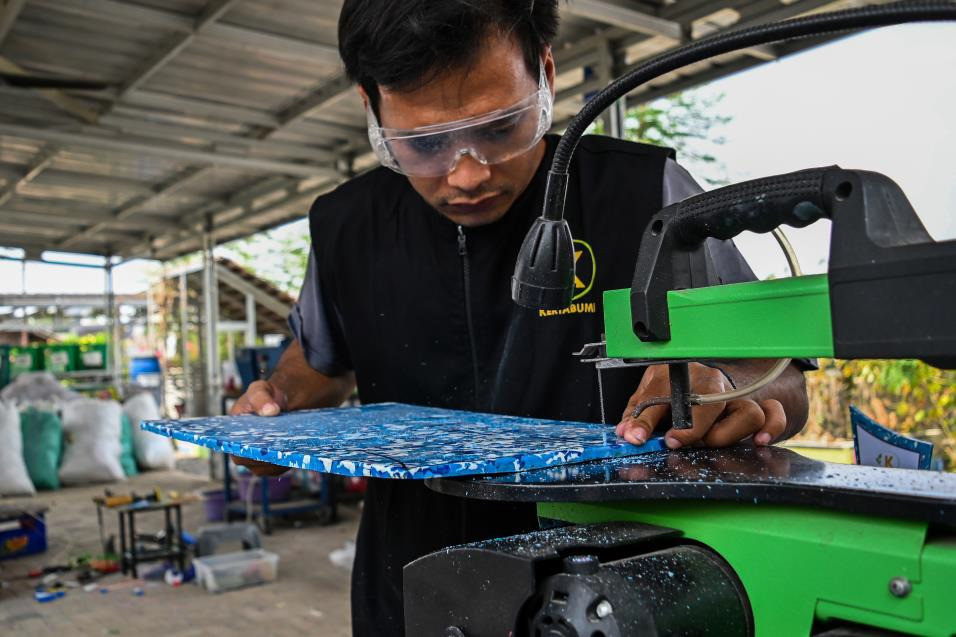Bali, 12 October 2023 – The blue economy program of Bulan Cinta Laut (Ocean Love Month) (BCL) is one of the strategies presented by Indonesia at the 2023 High-Level Meeting (HLM) of the Archipelagic and Island States (AIS) Forum in Bali on October 9 – 11, to serve as a good model in addressing marine debris issue.
The program, led by the Ministry of Marine Affairs and Fisheries (MMAF), has been running since early 2022. It has inspired various parties to innovate in proper marine debris management, thereby preventing it from polluting the oceans.
A portion of the community, including fishers in Padang, West Sumatra, compete to collect marine debris or waste as they can be exchanged for savings or gold coins. Sajameh is an innovative program that accommodates the conversion of waste into gold.
"Starting from the implementation of BCL last year in Padang, the harbormaster initiated the development of the Sajameh program at Bungus Ocean Fishing Port (PPS)," said Melly Masrul, Director of Sajameh Waste Bank Unit.
Sajameh is an abbreviation of ‘sarok jadi ameh,’ which in the Minang language means ‘from trash to gold.’ This program began in March 2023, following a similar concept to the BCL program, which aims to build a circular economy within the community with marine debris as the primary commodity.
PPS Bungus also prepared a waste bank to collect marine debris from the community, fishers, and sanitation workers at the port. The Sajameh team sorts the debris into categories, including metal, paper, plastic, used cooking oil, textile products, and organic waste such as leaves and tree branches.
Melly explained that the value of waste increases after it has been sorted. Apart from having higher value, the types of waste are also diverse. For example, a plastic water bottle can be separated into several components when sorted, including the bottle, the cap, and the branded plastic.
"The price for unsorted packaging bottles is around Rp700 per kilogram. However, it can reach Rp3,000 once sorted. That is only for the bottle. The caps can be sold separately, and the same goes for the branded plastic," Melly said.
The sorted waste is then handed over to PT Semen Padang and the central waste bank, Panca Daya, which partners with PT Pegadaian. These two entities pay for the waste in gold savings and pure gold.
Melly explained that PPS Bungus facilitates the process by providing the waste bank, recording the sales, and arranging transportation. The waste sales are directly handled by PT Pegadaian and PT Semen Padang, with the proceeds going to the accounts of Sajameh users.
She claimed that the Sajameh program manages to reduce 18 tons of waste from households and port activities weekly.
Implementing the Sajameh program is also an effort by PPS Bungus to assist Padang Regional Government in solving its waste issue. According to the city’s Environmental Agency, the residents of Padang produce over 600 tons of waste daily, the most in West Sumatra.
The local government estimated that the landfill will be overloaded by 2026. "Padang Mayor has issued a warning that the landfill will be full in 2026. It is only a matter of time. If we do not sort the waste, it will definitely happen," she emphasized.
After running for a few months, the Sajameh program has proven successful. The port’s sanitation workers, who are part of Sajameh’s team, have obtained over 20 mini-sized gold coins. In addition, the team utilizes organic waste for maggot farming in the waste bank area.
Jasni and her colleagues of sanitation workers at PPS Bungus were excited after discovering that the waste they collected turned into gold pieces.
The woman who has worked at the port for decades is now more environmentally conscious about waste. Her dream is to perform the pilgrimage to the Islamic Holy Land from her works in collecting waste.
"After Sajameh was introduced, if there is an event or some waste, I sort them and put them in a bag to collect more. I can save the waste while working at the port. I hope to perform an Umrah pilgrimage one day,” she said.
Throughout July to September 2023, the BCL program collected approximately 140 tons of waste from 18 regencies and cities in Indonesia. (TR/Elvira Inda Sari/SW/WW).
***
About AIS Forum:
The Archipelagic and Island States (AIS) Forum is a global platform for cooperation among island and archipelagic states that aims at strengthening collaboration to address global issues with four main areas of focus: climate change mitigation and adaptation, the blue economy, marine plastic debris, and good maritime governance. The 2023 High-Level Meeting of the AIS Forum is organized to reinforce the role of the AIS Forum as a center for smart & innovative solutions and a platform for collaboration in promoting the future agenda of global maritime governance.
For more information, please contact:
Director General of Public Information and Communications of the Ministry of Communications and Informatics – Usman Kansong (0816785320).
Get more information on press releases, news, photos, and videos related to the 2023 HLM of the AIS Forum at https://s.id/aispedia.
Foto caption: A worker cuts a commemorative plaque made from plastic waste at one of the Waste Banks. ANTARA FOTO/Sulthony Hasanuddin/Spt.

